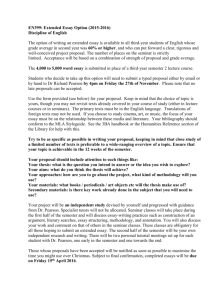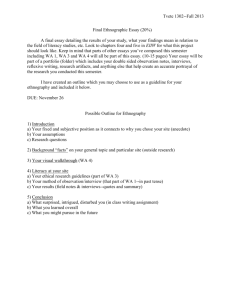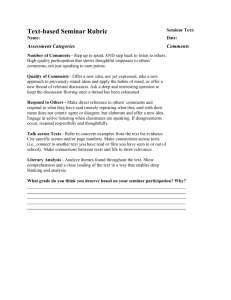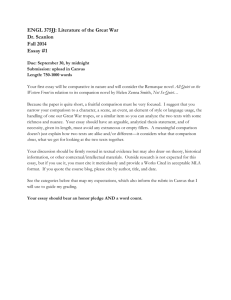2BA Course Outline 2015-2016 - National University of Ireland
advertisement
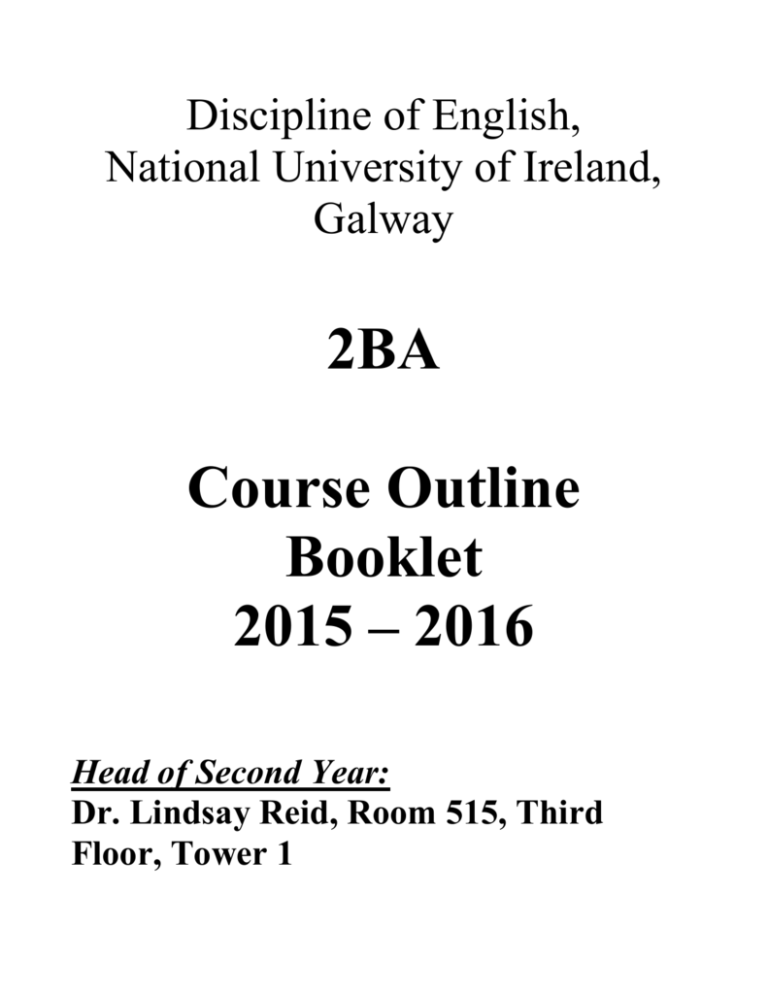
Discipline of English, National University of Ireland, Galway 2BA Course Outline Booklet 2015 – 2016 Head of Second Year: Dr. Lindsay Reid, Room 515, Third Floor, Tower 1 Second Year Semester 1, 2015-2016 Students are required to take: EN264 And ENG214 Plus ONE seminar course LECTURE COURSES (SEMESTER 1) EN264 STUDIES IN MEDIEVAL LITERATURE Chaucer wrote his famous Canterbury Tales in the 1370s and 1380s and this last great work of his is one of the most exciting and varied in the English language. Obscenity and profanity jostle with piety as twenty-three characters tell tales of fornication, magic, war, love, philosophy, religious devotion and virtue. The fourteenth-century alliterative poem Sir Gawain and the Green Knight is a striking example of the genre of medieval Arthurian romance. Chivalric worth, testing, temptation, religious devotion, games and nature are among the themes which permeate this tale of one knight’s quest to uphold the honour and integrity of the Round Table. In this course you will read two great works of the fourteenth century: Geoffrey Chaucer’s Canterbury Tales Sir Gawain and the Green Knight (author’s name unknown) Venue: Monday 5-6 O’Flaherty Theatre and Tuesday 3-4 Kirwan Theatre Lecturers: Dr. Dermot Burns and Dr. Clíodhna Carney Texts: Geoffrey Chaucer, The Canterbury Tales: Fifteen Tales and the General Prologue, ed. Glending Olson, 2nd edition (New York and London: W. W. Norton, 2005). Sir Gawain and the Green Knight, W. R. J. Barron, ed., revised edition (Manchester: Manchester University Press, 1998) Assessment: Essay (40%) End-of-Semester Examination (60%) ENG214 IRISH LITERATURE IN ENGLISH BEFORE 1900 On this team-taught lecture course we encounter a varied group of writers working over several centuries in different genres and styles, not all of whom considered themselves Irish, but all of whom had a strong connection to the island. It examines questions of genre, form, canonicity, performance, identity, authorship and publishing history as they are variously articulated by this group of authors. The course observes the beginnings of the formation of a self-consciously Irish literature in English, considering individual writers from a number of thematic, generic, and stylistic perspectives, while also exploring the influence of literary networks and textual cultures on shaping a national literature. Lectures engage with the work of a range of authors, including Oliver Goldsmith, Richard Brinsley Sheridan, Thomas Moore, Dion Boucicault, Bram Stoker, and Oscar Wilde, and trace the tributaries which led to the articulation of national literary canons at the turn of the twentieth century. Venue: Thursday 3-4 Kirwan Theatre and Friday 3-4 Kirwan Theatre Lecturers: Prof. Sean Ryder, Prof. Lionel Pilkington, Dr. Justin Tonra, and Dr. Richard Pearson Texts: A provisional selection of texts for the course includes: Oliver Goldsmith. She Stoops to Conquer. (New Mermaids). Richard Brinsley Sheridan. School for Scandal. (New Mermaids). Dion Boucicault. Selected Plays of Dion Boucicault. (Colin Smythe). Oscar Wilde. The Picture of Dorian Gray. (Oxford World’s Classics). A Course Book including essential poetry, prose, and selected criticism will also be available from PrintThat. Assessment: Essay (40%) End-of-Semester Examination (60%) Second Year Semester 2, 2015-2016 Students are required to choose between: ENG203 or ENG202 And ENG204 or EN2123 Plus ONE seminar course ENG203 GENRE STUDIES This course will involve the study of literary genres and how these relate to and emerge out of the cultural contexts that formed them. The course will focus on a series of literary texts representative of particular generic forms, for example, the realist novel, science fiction, political writing, imperial romance, historical fiction, children's fiction, utopian writing, travel writing. We will study generic narratives, myths and characters alongside cultural themes and contexts and evolving media formats. Venue: Thursday 12-1 IT250 IT Building, 1st Floor and Thursday 3-4 Kirwan Theatre Lecturers: Dr. Andrew O’Baoill and Dr. Richard Pearson Texts: (not in running order): George Eliot, Silas Marner (OUP) Lewis Carroll, Alice's Adventures in Wonderland (Norton) H.G. Wells, The Time Machine (Norton) Charlotte Perkins Gilman, Herland (Broadview) Nellie Bly - 10 Days in a Mad House Upton Sinclair - The Jungle Jules Verne - Around the World in Eighty Days Final text tbc Assessment: Essay (40%) End-of-Semester Examination (60%) ENG202 18TH CENTURY STUDIES This course aims to introduce students to the literature and culture of eighteenth-century Britain and Ireland. The Victorians loathed and disowned their eighteenth-century predecessors, denouncing their literature as disgusting, immoral, and horribly impolite. This assessment is not entirely unfair. Yet eighteenth-century authors were deeply concerned with politeness, with debating the meaning and role of literature and art-forms, and exploring the morality of human nature and society itself. This course seeks to uncover some of paradoxes of eighteenth-century writing in order to recover the richness of its literary heritage. It will look at the expansion of print culture, with the 'rise of the novel' as a dominant literary form, the modulations of satire, the flowering of 'sentimental' literature and its more carnal dimensions. Themes covered will include financial crisis, the tension between money and morality, and the slipperiness of gender and sexuality. While seeking to historicise the period, the course will also raise parallels with modern culture and explore what resonances the literature of the period might have for contemporary readers. Venue: Wednesday 10-11 Aras Ui Chathail Lecture Theatre and Thursday 3-4 Darcy Thompson Theatre Lecturers: Dr. Rebecca Barr Assessment: Essay (40%) End-of-Semester Examination (60%) ENG204 STUDIES IN EARLY MODERN LITERATURE This course seeks to familiarise students with the rich variety of early modern drama and poetry. To this end, we will consider the work of well-known authors such as William Shakespeare and Christopher Marlowe, alongside that of their less-familiar contemporaries, including Elizabeth Cary and Aemilia Lanyer. The course is arranged thematically, rather than in a text-based way, into two sections. Section A focuses on religious and political contexts that inform early modern literature. During the sixteenth and early seventeenth centuries, England was ruled by several monarchs, experienced religious reformation and conflict, faced a succession crisis and lived in threat of foreign invasion. We will be exploring how these historical circumstances informed literary representations of kingship and court politics, and articulations of faith and belief. Having addressed some political and religious contexts for interpretation of early modern literature, Section B moves to consider identities (of gender, race and sexuality). This section of the course will address ideas such as gender transgression, desire, female speech, selfhood, and difference as they are manifested in drama and poetry by male and female writers. Venue: Monday 5-6 O’Flaherty Theatre and Tuesday 3-4 O’Flaherty Theatre Lecturers: Dr. Victoria Brownlee Texts: Christopher Marlowe, Edward II William Shakespeare, The Tempest William Shakespeare, Othello William Shakespeare, Antony and Cleopatra Elizabeth Cary, The Tragedy of Mariam Course Reader Assessment: Essay (40%) End-of-Semester Examination (60%) EN2123 STUDIES IN THE AGE OF SHAKESPEARE This lecture course examines a range of sixteenth and seventeenth British literature written by Shakespeare and his early modern contemporaries. Section A of EN2123 will run on Mondays and Tuesdays from weeks 1 to 6, and Section B will run on Mondays and Tuesdays from weeks 7 to 12 of the semester. Section A: Topic TBD. Section B: Section B of ‘Studies in Renaissance Literature’ deals with Shakespeare’s Hamlet and its confluences. We will begin by raising broad questions about what ‘Shakespeare’ means and why we continue to study his works today. Our first few lectures will investigate the varied resonances of ‘Shakespeare’ across time and cultures. The remainder of this section will then be dedicated to an intensive investigation of the work for which Shakespeare is best remembered in contemporary society: Hamlet. Not only will we apply a variety of modern critical lenses (including feminist and Freudian theory) to this Renaissance play, but we will also give some consideration to how Hamlet has been received and adapted by later authors such as Iris Murdoch or Laura Bohannan. Venue: Monday 5-6 AM250 Colm O’hEocha Theatre and Tuesday 3-4 IT250 IT Building Lecturers: Dr. Lindsay Reid and TBD Texts: Section A: TBD Section B: A course reader, available from PrintThat William Shakespeare, Hamlet (Norton edition), available from the university bookshop Assessment: Essay (40%) End-of-Semester Examination (60%) LIST OF 2BA SEMINARS (SEMESTERS 1 and 2) Choose ONE each semester STUDENTS MUST TAKE A DIFFERENT SEMINAR COURSE EACH SEMESTER. STUDENTS MAY NOT TAKE TWO SEMINARS WITH THE SAME COURSE TITLE EVEN IF THE COURSE CODE IS DIFFERENT. Code EN278.I/ EN278.II Seminar Title MILTON’S POETRY Dr. Victoria Brownlee Semester available 1 and 2 This course focuses on John Milton’s biblical epic Paradise Lost, which tells the story of Adam and Eve, their fall from Eden, and the conflict between Satan and God. The seminar’s primary aim is to facilitate a close reading of Milton’s poem while also referring to seminal critical interpretations. We will explore the poem’s treatment of character and motivation, good and evil, free will, gender, politics, marriage, and literary epic. For the purposes of comparison, we will consider extracts from the King James Bible, and explore how the political, theological, and philosophical contexts of the seventeenth century inform Milton’s reading of the biblical narrative of Genesis. Venue Monday 11-1 AMB-G043 Seminar Room, Arts Millennium (Semester 1) Monday 11-1 Room 302 Tower 1 (Semester 2) Assessment: 30% continuous assessment (one oral presentation (10%), and one written assignment (20%)); 70% final essay. EN280.I/ EN280.II TRANSFORMATIONS OF THE NOVEL The Novel and the Ethical Effects of Reading Ms. Kathleen Pacious 1 and 2 Monday 9-11 TB306 Tower 2 1 and 2 Tuesday 9-11 TB306 Tower 2 (Semester 1) The crossover of literature and ethics is an exciting and recent field in literary studies. This seminar pays particular attention to the capacity of novels to persuade, influence, and affect their readers. We will explore topics that include aesthetics vs ethics, empathising with “bad” characters, the connection between novel-reading and empathy, fictionality vs reality, the relationship between reader and author, the role of affect in literary studies, and how to “measure” readerly engagement and ethical influence. Eschewing the idea that ethics only focuses on moral issues, we will draw on narrative theory as we engage in close reading of four novels from 1818-1989, drawing on historical and contemporary ethical theories. The novels include: Jane Austen’s Persuasion (1818), Elizabeth Gaskell’s North and South (1855), E.M. Forster’s Howard’s End (1910), and Kazuo Ishiguro’s Remains of the Day (1989). Assessment: 30% continuous assessment (10% in-class assignments, 20% mid-term essay), 70% final essay. EN2112/ EN2100 CREATIVE WRITING "Patrols of the Imagination" Ms. Siobhan Kane This course will provide a context and framework to nourish and enhance students' interest and ability in creative writing, with a mixture of weekly writing exercises and critical readings of notable writers, with a particular focus on the short story, referencing some of the genre's greatest exponents, such as; Edgar Allen Poe, Flannery O' Connor, Raymond Carver, Roald Dahl, James Joyce, Kurt Vonnegut, Alice Munro, William Carlos Williams, Annie Proulx, Kate Chopin, and Ray Bradbury. The course will also touch on a diverse range of novels, creative nonfiction, and poetry, and encourage weekly class discussions around the culture and processes of creative writing. EN2114/ EN2102 Assessment: 30% continuous assessment (a combination of weekly written exercises and critical reviewing,) and 70% final submission a creative writing project of the student’s choice i.e. a chapter of a novel, some short stories, poems, play, or non-fiction. RENAISSANCE DRAMA Ms. Kirry O’Brien 1 and 2 Tuesday 9-11 Room 302 Tower 1 1 and 2 Thursday 1-3 TB306 Tower 2 1 and 2 Tuesday 9-11 Q1, Huston School of Film and Media (Block Q, Earls Isla nd) This course explores four plays, two by William Shakespeare and two by his predecessor Christopher Marlowe. We will examine the development of theatrical drama during this era, and invigilate many of the concerns of the day that were addressed by said theatre: Kingship, power, race, gender etc. Texts: Christopher Marlowe’s The Jew of Malta and Edward II. William Shakespeare’s The Merchant of Venice and Henry IV. Assessment: 15% for the class presentation write up, 15% for a midterm minor essay and 70% for the final essay. EN2115/ EN2103 RENAISSANCE DRAMA Dr. Dermot Burns This course examines the treatment of love in three of Shakespeare’s plays: Romeo and Juliet, Twelfth Night and Measure for Measure. The method of study will involve close textual analysis and consideration of a variety of critical approaches to the plays. Texts: William Shakespeare’s Romeo and Juliet, Twelfth Night and Measure for Measure. Assessment: two short essays (15% each) - 30%, one final in-class essay 70%. EN299.I/ EN299.II FILM AND SHAKESPEARE Dr. Lindsay Reid What happens when a Renaissance-era stage play is adapted for the contemporary screen? Why have successive generations of filmmakers so often sought to reinterpret Shakespeare’s works? What does the plethora of modern film adaptations say about the ‘Shakespeare Industry’? This seminar is designed for students interested in exploring Shakespeare's dramatic art alongside cinematic adaptations of his plays. We will study one tragedy and one comedy from Shakespeare (Romeo and Juliet and The Taming of the Shrew, respectively) as a means to understanding the interpretative choices made by filmmakers who have reworked these two texts. Feature-length films under our consideration will include Romeo and Juliet (1968), Shakespeare in Love (1998) and 10 Things I Hate About You (1999), among others. Assessment: 15% group presentation, 15% film review, and 70% final essay EN2116/ EN2106 SHAKESPEAREAN COMEDIES Ms. Kirry O’Brien 1 and 2 Tuesday 11-1 TB306 Tower 2 1 and 2 Wednesday 9-11 TB306 Tower 2 1 and 2 Monday 3-5 TB306 Tower 2 This seminar will examine, in detail, some examples of Shakespearean Comedy. Shakespeare’s comedies end in marriage: however, many trials and obstacles have to be overcome along the way. We shall explore the complex issues raised on the journey towards a so-called happy ending. Recommended (not obligatory) text: RSC William Shakespeare Complete Works ed. Jonathan Bate and Eric Rasmussen. Plays: A Midsummer Night’s Dream, As You Like It, Twelfth Night, Measure For Measure. Assessment: 15% for the class presentation write up, 15% for a minor essay and 70% for the final essay. EN2117/ EN2107 SHAKESPEAREAN COMEDIES Ms. Kirry O’Brien This seminar will examine, in detail, some examples of Shakespearean Comedy. Shakespeare’s comedies end in marriage: however, many trials and obstacles have to be overcome along the way. We shall explore the complex issues raised on the journey towards a so-called happy ending. Recommended (not obligatory) text: RSC William Shakespeare Complete Works ed. Jonathan Bate and Eric Rasmussen. Plays: A Midsummer Night’s Dream, As You Like It, Twelfth Night, Measure For Measure. Assessment: 15% for the class presentation write up, 15% for a minor essay and 70% for the final essay. EN441.I/ EN441.II PLAYS, PLAYERS AND PLAYHOUSES Victorian Farce and Melodrama Prof. Richard Pearson This seminar explores the popular forms of theatre that dominated the nineteenth century: farce and melodrama. We will examine a number of texts within each genre to identify their central characteristics, and then consider how these plays were situated in the theatrical and cultural contexts of the day. We will look at the playwrights, theatres, managers and actors who wrote, staged and performed some of the most popular examples of the forms. Above all, we will explore the question of why these forms became so dominant in the nineteenthcentury London theatre. Texts include a series of One-Act farces: J.M. Morton, Box and Cox and Grimshaw, Bagshaw and Bradshaw; William Brough, Apartments; Mark Lemon, The Ladies’ Club; J.S. Coyne, How to Settle Accounts with your Laundress; and a series of Melodramas: Dion Boucicault, The Colleen Bawn and Jessie Brown; or, The Relief of Lucknow; Charles Dickens & Wilkie Collins, The Frozen Deep; Colin Hazlewood, The Chevalier of the Maison Rouge; or, The Days of Terror!; Tom Taylor, The Ticket-of-Leave Man; H.M. Milner, Mazeppa. NOTE – YOU WILL NEED TO BRING A TABLET, LAPTOP OR E-READER TO THESE CLASSES, AS ALL TEXTS ARE ONLINE. Assessment: Portfolio (30%); final essay (70%). EN444.I/ EN444.II PAIN AND PLEASURE IN JACOBEAN THEATRE Prof. Lionel Pilkington 1 and 2 Jacobean drama is well known for its often-spectacular stage explorations of sexual transgression and social punishment. This course considers four of the most famous of these plays, and examines the relationship between theatricality, social order, power and sexual desire. The main emphasis of the course will be on close textual analysis, and to that end a detailed knowledge of all four plays will be essential. As well as class presentations, there will be two short critical essays. Semester 1 Thursday 9-11 Room 302 Tower 1 Semester 2 Thursday 9-11 Room 302 Tower 1 Texts: William Shakespeare, Measure for Measure (Penguin); Anon The Revenger’s Tragedy (New Mermaids or Methuen); Thomas Middleton and John Rowley’s The Changeling (NHB or New Mermaids); John Ford’s ‘Tis Pity She’s a Whore (NHB or Revels New Student Edition). Assessment: 30% for continuous assessment (15% for a short [1000 word max] essay and 15% for general class participation including completion of a one page in-class analysis). 70% for final (2,000 word max) essay. ENG201.I/ ENG201.II EXPLORING THE CREATIVE ARTS Ms. Mary McPartlan This ten-week course aims to offer students of literature and theatre an opportunity to experience other relevant art forms, thereby gaining a valuable broader context for their chosen field of study. Thus,traditional Irish music, old style and contemporary song and dance, one contemporary Irish Film, one contemporary Irish Play and a TG4 documentary will be included, with a view to developing a critical understanding of the creative arts, and the varied forms of cultural expression. The Arts in Action programme will be a compulsory element of study with attendance at three of the workshop- lunchtime performances, follow up class discussion and written reviews. Valuable resourceTexts: - Carson, Ciarán, The Pocket Guide to Irish Traditional Music; - Breathnach, Breandán. Folk Music and Dances of Ireland; - Hast, Dorothea and Scott, Stanley. Music in Ireland: Experiencing Music, Expressing Culture; - Brennan, Helen. The Story of Irish Dance; - White, Harry, and Barra Boydell, eds. The Encyclopdia of Music in Ireland. 1st ed. Vol. 1&2; - Mulrooney, Deirdre. Irish Moves: An Illustrated History of Dance and Physical Theatre in Ireland. Assessment: 30% Continuous assessment and 70% end of term essay of 2,000 words. 1 and 2 Wednesday 11- 1 Large Acoustics Room, Aras na Mac Leinn. ENG205.I/ ENG205.II OLD ENGLISH I – INTRODUCTION TO LANGUAGE AND READING Francisco Rozano Garcia 1 and 2 Monday 1-3 TB306 Tower 2 1 and 2 Thursday 9-11 TB306 Tower 2 1 and 2 Tuesday 11-1 Room 302, Tower 1 (Semester 1) Old English is an exciting and beautiful language. Apart from being an invaluable object of study to those with an interest in etymology, it is the vehicle for some of the most challenging and captivating literature you will ever read. This course will provide you with a thorough introduction to learning to read Old English without painful memorisation! We’ll think about many important theoretical issues related to engagement with the language and its texts, and we’ll explore the culture of the Anglo-Saxon people. Texts: Robert Hasenfratz and Thomas Jambeck’s Reading Old English. Assessment: Weekly assignments 30% (five assigned, best three chosen); Essays 70% (two short essays assigned, worth 35% each). ENG207.I/ ENG207.II 19TH CENTURY WRITING: SCARY LONDON Anna Gasperini Victorian London was the natural environment of some of the scariest monsters of literature in the English language. This course focuses on representations of the Victorian city in serialized popular fiction, cheap literature written specifically for lower-class readers. Using a critical approach based on new historicism and spatial theory, the course analyses the monstrous characters and spaces of literature from the perspective of Victorian London’s geography, class structure, and such infrastructures as markets, workhouses, hospitals, and cemeteries. Finally, the course examines how the space and characters of Victorian London survived, through adaptation and reinvention, in contemporary fantasy fiction. Main texts: Charles Dickens, Oliver Twist 1837 (Oxford edition); G.W.M. Reynolds, The Mysteries of London 1846-52; James Malcolm Rymer, Sweeney Todd (1846-7); Neil Gaiman, Neverwhere (1996). Assessment: 30% Continuous Assessment (20% Short Writing Assignment + 10% Class Presentation) , 70% Final Essay ENG208.I/ ENG208.II TWENTIETH CENTURY STUDIES Dr. David Clare This seminar will examine the children’s fiction of Belfast writer C.S. Lewis, alongside Irish children’s literature that either influenced his work or that has much in common with it. Lewis was heavily influenced by the literature of his native country – particularly Irish works of fantasy by Swift and Stephens. Like Wilde and Edgeworth, he attempted to infuse his work with spiritual and moral teachings while never losing sight of the need to tell a good story. Writers who came after Lewis, such as Lavin, have tried to emulate his success at introducing supernatural happenings into the prosaic lives of ordinary children. The anti-colonial themes in the work of Lewis and the other writers will also be discussed. Texts: Jonathan Swift – Parts I & II of Gulliver’s Travels; Maria Edgeworth – Eton Montem, “The Orphans”, and “The White Pigeon”; Oscar Wilde – “The Selfish Giant” and “The Happy Monday 2-4 IT204 IT Building (Semester 2) Prince”; James Stephens – The Crock of Gold; C.S. Lewis – The Magician’s Nephew, The Lion, the Witch and the Wardrobe, and The Voyage of the Dawn-Treader; Mary Lavin – A Likely Story [All but the Lewis and the Lavin will be included in a Course Handbook]. Assessment: 30% continuous assessment (class participation, one oral presentation and one, brief written assignment); 70% final essay. ENG223.I/ ENG223.II SPECIAL THEME Dr. Sorcha Gunne 1 and 2 Wednesday 3-5 Room 302 Tower 1 1 and 2 Monday 9-11 Room 302, Tower 1 Bodies and Ireland This module will explore representations and registrations of the body in a selection of Irish and related writing and film from the late twentieth and early twenty-first centuries. It will consider both the specificities of the Irish socio-historical context and the corresponding conditions of global modernity. As such, it will examine the tensions, negotiations and new articulations that can be read through the lens of both Irish social history and transnational configurations of bodies, particularly women’s bodies. The module has been arranged into 4 interconnected units of intellectual debate. By way of introduction, we begin by considering the female embodiment of Ireland in discourses of nationalism. We will then think about the embodiment of Ireland through the literary trope of the body in the bog. We next turn to the topic of food and hunger before concluding with two units that will explore the policing of women’s bodies in various manifestations. Reading list includes: Seamus Heaney, North (1975, selections from) Aislinn Hunter, Stay (2002) Marita Conlon-McKenna, Under the Hawthorn Tree (1990) Eavan Boland, Domestic Violence (2007, selections from) Shani Mootoo, Cereus Blooms at Night (1996) Emer Martin, Baby Zero (2007) Eimear McBride, A Girl is a Half-formed Thing (2013) Assessment: 30% continuous assessment, 70% final essay EN298.I/ EN298.II Edmund Spenser’s Faerie Queene Dr. Clíodhna Carney Edmund Spenser’s Faerie Queene (1590s) is one those very rare works of art into which a whole culture seems to have been poured. There is everything in it: love, sex, evil, religion, theories of government, philosophy, violence, slavery, perversion. And above all, brilliant poetry. Spenser was looking in two directions: back to the literature of Virgil, and forwards through the political and religious change of his own time into a hypothetical future world. Our class will involve a close reading of Books 1 and 2, and students can bring all sorts of other interests to bear on our discussions: history, science, philosophy, political science, mythology, classics. Text: Edmund Spenser, The Faerie Queene, ed. A. C. Hamilton, rev. ed. (Longman, 2007). Assessment: 30% continuous assessment (4 short written assignments: 20% (i.e. 4 x 5%); one panel discussion: 5%, one debate: 5%) and one long end-of-term essay: 70%. EN2113/ EN2101 Creative Writing Siobhan Kane 1 and 2 This course will provide a context and framework to nourish and enhance students' interest and ability in creative writing, with a mixture of weekly writing exercises and critical readings of notable writers, with a particular focus on the short story, referencing some of the genre's greatest exponents, such as; Edgar Allen Poe, Flannery O' Connor, Raymond Carver, Roald Dahl, James Joyce, Kurt Vonnegut, Alice Munro, William Carlos Williams, Annie Proulx, Kate Chopin, and Ray Bradbury. The course will also touch on a diverse range of novels, creative nonfiction, and poetry, and encourage weekly class discussions around the culture and processes of creative writing. Tuesday 1-3 Room 505, English Dept Tuesday 1-3, TB306, Tower 2 Semester 2 Assessment: 30% continuous assessment (a combination of weekly written exercises and critical reviewing,) and 70% final submission a creative writing project of the students choice ie. a chapter of a novel, some short stories, poems, play, or non-fiction. EN2119/ EN2120 Media Studies Bernadette O’Sullivan 1 and 2 Friday 11-1 TB306, Tower 2 (Semester 1) 1 and 2 Wednesday 5-7 TB306, Tower 2 This Seminar series is an introduction to journalism. Students who engage fully with all aspects of the seminar will begin to develop the knowledge, practical skills and confidence to find their journalistic voice: to generate ideas and research and develop a portfolio of journalistic material. Students will select and attend two newsworthy events on campus, in the city, or in their own locality and submit follow-up work. Assessment: Portfolio of journalistic work: 30% continuous assessment and 70% for final portfolio of articles. EN2121/ EN2122 Media Industries A Andrew O’Baoill How do issues of ownership, funding, and organisation shape our media environment? This course will provide an introduction to study of media industries, through a critical political economic lens. We will examine a variety of models, including commercial, political economic and alternative; identify the institutional pressures shaping media texts; and discuss the role of a number of interventions aimed at disrupting 'business as usual' in the mass media ENG213.I/ ENG213.II Assessment: 30% Continuous Assessment and 70% Final Assessment Film Studies Dr Fiona Bateman This seminar is an introduction to studying film in an academic context. During the semester students will develop new ways of watching and thinking about films; they will learn how to ‘read’ a film. Issues including genre, intertextuality, narrative and narration will be discussed in class. The films (texts) which students will view and analyse for the course are all Irish, chosen because they share certain thematic characteristics but differ in significant ways. The films are: Flight of the Doves (1971), Into the West (1992), Mickybo and Me (2006) and Kisses (2008). As we will be focussing on Irish films, this seminar will also address representations of Ireland and Irishness on screen. Assessment: 3 short assignments (10% each) and 1 essay (70%). 1 and 2 Thursday 9-11, B1 Huston School of Film & Media (Semester 1) Friday 12-2, Q1 Huston School of Film & Media (Semester 2) ENG222.I/ ENG222.II Special Author: Jane Austen Muireann O’Cinneide 1 and 2 Wednesday 3-5 TB306 Tower 2 1 and 2 Monday 1-3 CA002 Cairnes Building (Semester 1) This seminar explores a selection of the writings of Jane Austen (1775-1817). Austen’s current status as one of the best-loved and most critically-admired novelists in English literature can obscure the formative influences and cultural contexts of her work. This module begins with some of Austen’s earliest work, tracing a transition in narrative voice from parody to satire to a distinctive ironic mode. It then traces the refinement of this mode into a powerful tool of ethical commentary through examining two of Austen’s most complex and often-misunderstood mature novels. We will also examine the present-day cultural production of Austen as author through twentieth-century cinematic adaptations and literary pastiches. Main Texts: “Love and Freindship” (~1790); “Lady Susan” (~1794); Northanger Abbey (1818); Mansfield Park (1814); Emma (1815). Oxford University Press editions (where possible), esp. the 2008 edition for NA. ENG217.I/ ENG217.II Assessment: 30% continuous assessment (15% class presentation; 10% written assignment(s); 5% in-class participation); 70% final essay. MEDIA STUDIES Exploring Journalism Mrs. Bernadette O’Sullivan This Seminar series is an introduction to journalism. Students who engage fully with all aspects of the seminar will begin to develop the knowledge, practical skills and confidence to find their journalistic voice: to generate ideas and research and develop a portfolio of journalistic material. Students will select and attend two newsworthy events on campus, in the city, or in their own locality and submit follow-up work. Assessment: Portfolio of journalistic work: 30% continuous assessment and 70% for final portfolio of articles. Monday 1-3 AM112 Arts Millennium Building (Semester 2)

